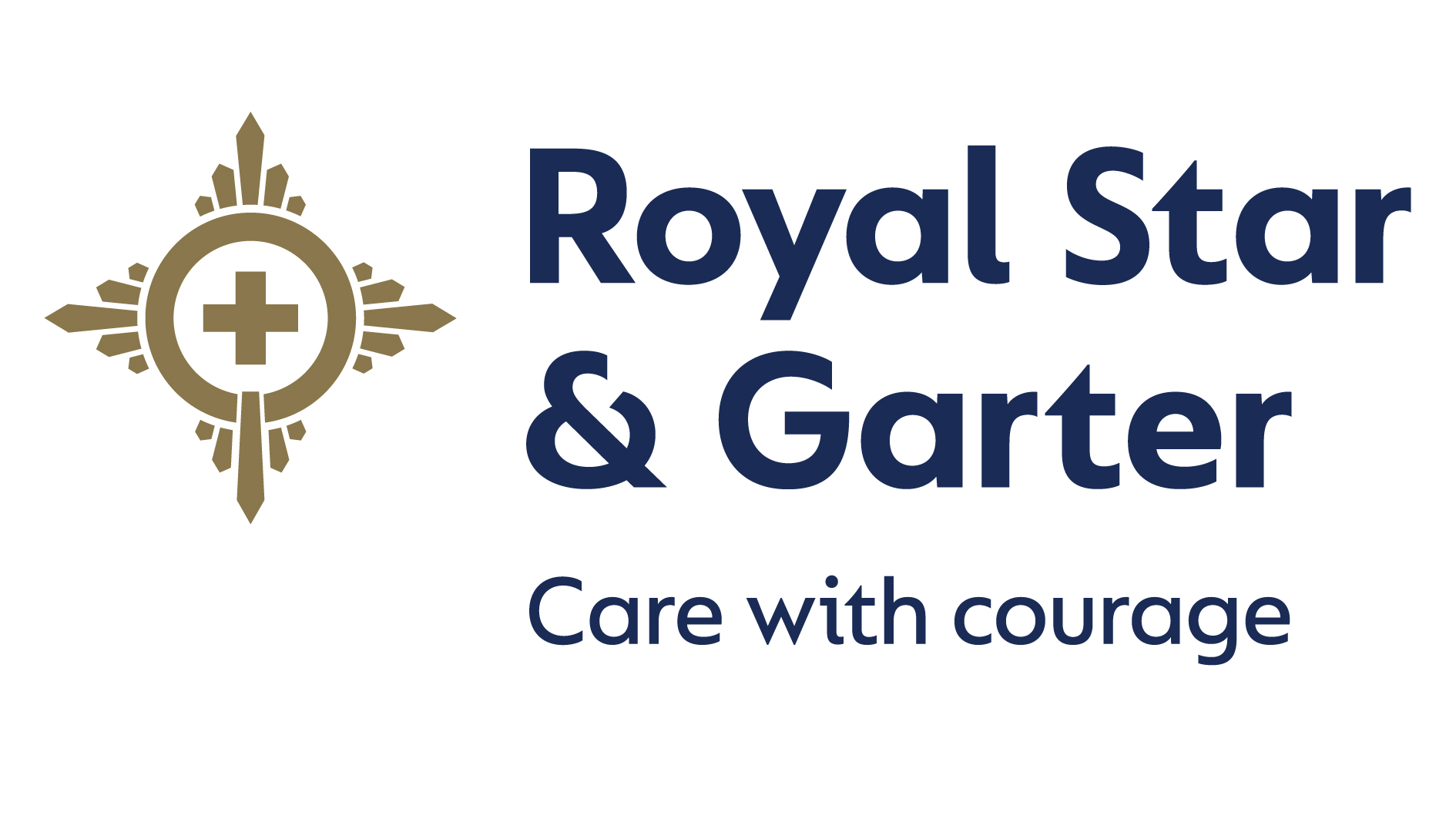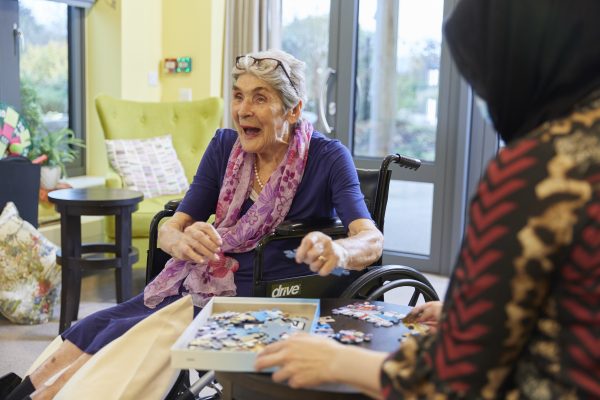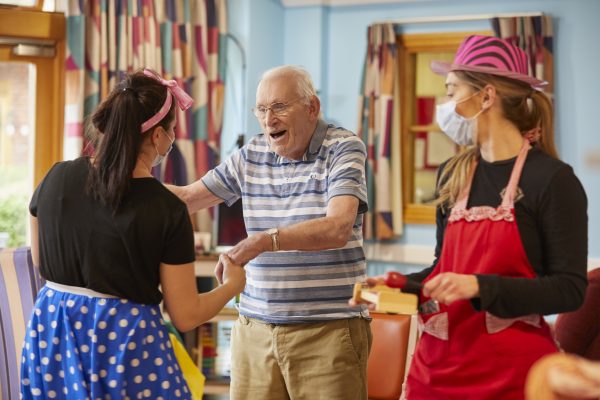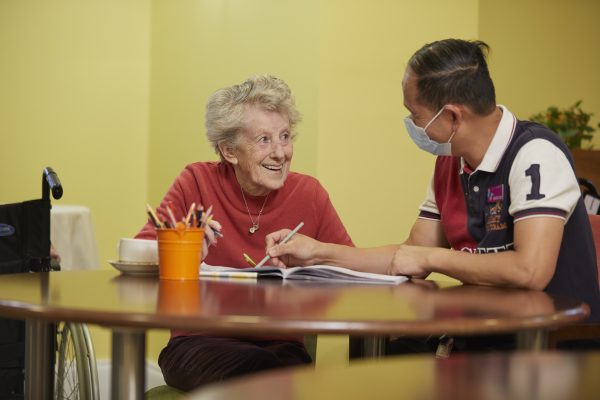Royal Star & Garter’s dementia care is nationally renowned. In 2021 almost 40% of our residents were living with dementia and received our award-winning dementia care. To mark Dementia Action Week (16-22 May), the charity’s Director of Care, Pauline Shaw, explains how staff look for early tell-tale signs, and the support they offer residents and their families.
Our care staff are able to recognise early signs of dementia because they know residents so well, and this all comes back to our person-centred care. We make the time to get to know what makes the resident tick, their daily routine, behaviour and habits, and how they communicate. The close relationship between staff and residents is such that any change would be very obvious, or become obvious over time. Our relationship with relatives is also so important, and we learn from their deep understanding of their loved ones when they have noticed some changes.
At first, the behaviour change can be subtle. Dementia isn’t just about memory loss. What you often see is behavioural changes, and something that seems out of character. It could be that the individual is repeating themselves or using the wrong words. They might become hyper-sensitive or become distracted and lose interest in something that would have been important to them. This can happen to any one of us, but it’s about spotting a different pattern of behaviour. Our staff would be looking for a general change in mood or stability of mood.
Of course, memory loss is also a symptom. Formative memories will usually stay securely in place, but things that happened today, yesterday, last week, will start to be more difficult to recall and they might even disappear.
They may also have difficulty in concentrating on things that require a sequence or process, like getting dressed, and get easily confused over things.
No one’s experience of dementia is the same, so people do have their own unique journey.
Our staff are trained to look for symptoms and signs, but that alone is not as holistic as knowing our residents in the way the staff do. We have such a caring rapport and relationship, and staff can spot the subtle changes. They do look for the symptoms, but because staff know the residents so well, they can align their knowledge with that training.
It’s not an easy thing to do, because someone who is developing dementia could well have insight into their memory loss or and may be able to cope and cover for their symptoms. They may get confused about the day or month, or start misplacing things. Sometimes we hear people say ‘Oh aren’t I being silly!’ and try to make a joke of it. They reckon this is the most distressing stage of dementia to be in. So we enable staff, through effective learning and development opportunities, to be able to support that person, and understand the place and space that that person is in. They don’t want sympathy, they may find empathy and someone to join them in that moment and acknowledge it’s confusing. We help to bring them around to find a solution. It takes a lot of skill and emotional intelligence to be able to make that person feel safe, despite the change in their situation.
In our Homes, if we have identified that there’s a definite change in a resident (who isn’t receiving dementia care), the first thing we do is have a conversation with the resident, and also with their family. If can be very difficult for some people to come to terms with. People can resist the thought of their loved ones having dementia for many reasons, such as stigma or losing the person they love. We help them access other support, such as Alzheimer’s Society, their GP or a memory clinic. We sit down and talk through the changes we’ve noticed and review their care plan. We offer a tour of our dementia families, discuss our person-centred approach to dementia care and talk to them about our model of care, how it’s different to the care they are currently receiving and how it will benefit the resident. It’s different environment because of the colours, the clear signage to help people find their way around, the stimulating and meaningful decoration – it all helps prompt conversation and memory. And staff training is even more specific to the resident, using reminiscence and different techniques to connect with people.
We take a compassionate, supportive approach to relatives, we understand how distressing it can be, given people’s impression of what dementia care in care homes is like. It’s not like that at Royal Star & Garter. We have received recognition for our dementia services and outstanding CQC (Care Quality Commission) reports to back that up.
Once a decision has been made, in the best interests to move a resident from nursing to dementia care, we make it a gradual transition. We explain to them that they’re going to spend a little time with a different family, so they can build up familiarisation. Some people adapt straight away and are perfectly content whilst others need a slower approach. That’s fine and perfectly normal. We do everything gently, and at each individual resident’s pace.
There are instances where a resident in nursing care may be diagnosed with dementia but we decide it is best for them to stay where they are. This is done if their nursing need is more significant. If they need a more clinical approach, we would think twice about moving somebody into a dementia care family. We only move someone if it’s in their best interest.
It’s important to remember, and we do stress this, that there is still a quality of life to be enjoyed. A diagnosis of dementia isn’t a reason to live an unhappy life. There can still be a good quality of life – we call it living well with dementia.




















